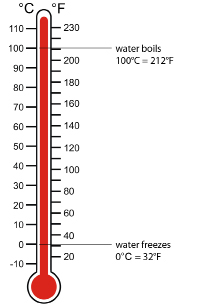Module 2
1. Module 2
1.23. Page 3
Module 2: The Imperial System
Explore
Work with a partner if possible.
In Module 1 you explored the Celsius scale. Do you remember the freezing point of water in degrees Celsius? In your activity in Get Started, you discovered that the freezing point of water on the Fahrenheit scale is 32°F and that this temperature corresponds to 0°C.
Recall that the boiling point of water is 100°C. In degrees Fahrenheit, water boils at 212°F.
 Try This
Try This

© Ivanou Aliaksandr/shutterstock
Use this thermometer to answer the Try This questions.
Use information from the graphic of the thermometer to help you answer the following questions.
TT 2. How many Celsius degrees are there between freezing and boiling?
TT 3. How many Fahrenheit degrees are there between freezing and boiling?
TT 4. Which degree is larger—a Fahrenheit degree or a Celsius degree? How do you know?
Do you need a quick review on expressing fractions in their simplest terms to help you answer TT 4? To express a fraction such as ![]() in its simplest terms, divide 10 and 18 by their largest possible whole number factor.
in its simplest terms, divide 10 and 18 by their largest possible whole number factor.
TT 5. Determine each of the following ratios. Express them as fractions in their simplest terms.
Use your answers for the ratios in a. and b. to complete these equations by writing in the appropriate fractions.
- 1 Celsius degree = __ × 1 Fahrenheit degree
- 1 Fahrenheit degree = __ × 1 Celsius degree
TT 6. How might these fractions be used to help work between these two temperature systems? You may use an example from the chart in Get Started. Note that, later in the lesson, you will be asked to attach a copy of your response to TT 6 to your Assignment Booklet. Your response to TT6 will be marked as part of your Assignment Booklet.
 Share
Share
It’s time to share your answers from TT 2 to TT 6. Remember that sharing work is an important part of learning. Use the following tips to ensure you get all the benefits from this sharing opportunity.
- Complete the questions to the best of your ability. Make sure your answers are in a form that you can easily share with another student or with your teacher, if so directed.
- Use your class discussion area, or another method indicated by your teacher, to post your answers and to view the work of the people you’re sharing with.
- Compare your answers to the other posted answers. Identify where you have similar answers and where your answers are different. Discuss all differences between answers until you agree on the answers. If necessary, you may wish to involve your teacher in your discussion.
- Revise your answers where necessary.
Save a revised copy of your work in your course folder. Ask your teacher whether you should also save a summary of your discussion in your course folder.
The largest whole number that divides both 10 and 18 is 2.
So,
![]()